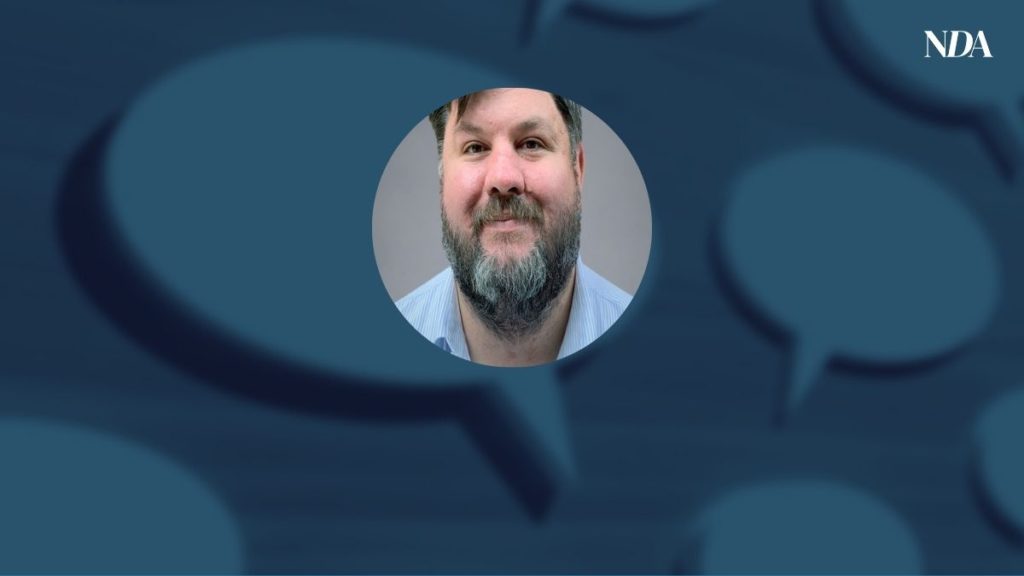Rob Webster is Founder of Canton Marketing Solutions. He’s worked in the adtech industry since 2001 and is NDA’s monthly adtech columnist.
“The only thing necessary for the triumph of evil is for good men to do nothing.” This quote, routinely attributed to Edmund Burke, sums up many of the problems in the world but also in digital advertising, our own area of concern and responsibility.
At a time when many people are suffering in the world due to actions of others that can only be described as evil, I think it is worth us looking at why and what, in our own area of influence, we can do to improve things and clean up.
In the last few weeks, it’s been humbling to see the many Ukrainians and others in our industry really attempt to help with fundraising for medicines and other aid as well as efforts to educate Russians and the world about what’s really happening. For those that can, I would encourage everyone to engage with these amazing schemes.
Closer to home though, there is so much that we can do to help reduce evil in our own sphere. It may be a mistake to compare these things to the horrors of war for that is on a whole different scale. Yet in an industry built around the communication of information, these offences do have a magnified effect on society. Fraud, hate speech and new issues like carbon emissions have been allowed to proliferate under the noses of the good people working in our industry. Some of these tactics have, in fact, become weapons of (cyber) war so it’s vital that as an industry we do all we can to cut it down.
The consequences are legion and range from a loss of trust in the industry, disinformation being allowed to spread, funding being taken from our legitimate publishers (required for society to operate) and indeed funds being allocated to bad actors/criminals and terrorists. I have been working with some amazing people across the globe via social groups to help solve these issues and I feel like more than ever before the industry is growing up and starting to attack these issues head-on rather than to allow them to continue.
The tragedy of the commons
A big part of the reason problems occur, despite the intentions of good people, is a concept known as “the tragedy of the commons”. This is a feature where individuals share in the benefit of a shared resource – in the original example a common ground in a village for example. Yet despite how these common resources benefit everyone often they can be spoiled, in the case of a park by litter, overfishing a lake/sea or in the case of digital marketing allowing fraud/bad content/hate and more to proliferate our ecosystem. This is such an important concept in the world that encompasses many of the biggest challenges we face as a society today from overfishing to global warming and indeed the state of independent digital marketing.
So why does this happen? Well, it’s because an individual actor is not sufficiently incentivised to look after the shared resource. One person or boat overfishing makes that actor more money and only in the long term does it deplete the shared resource. For digital marketing, it means that publishers and platforms don’t do enough to make sure that bad content doesn’t go into the ecosystem polluting it for everyone (lowering confidence, allowing bad actors to thrive). Let’s be very clear here, some publishers and platforms have and continue to turn a blind eye to fraud and other evils in our industry because that helps them hit their revenue or growth targets.
Walled gardens score better on such issues because they have sole ownership of their networks and so cannot hide behind opacity in quite the same way (though they are far from perfect and do also hide behind opacity – see my previous on Google and Facebook). In any case, if we as an industry can clear up the open ecosystem that too will apply pressure on the giants to improve their game. Pointing at others and whataboutery is no solution at all.
Transparency is the answer
The solution to such issues is in all cases transparency and responsibility. If society knows who is dumping on common ground they can be shamed/arrested changing the incentives to do bad things. If we can measure precisely who is selling and buying this problematic inventory or spreading disinformation then action can be taken. This technique applies to knowing who litters a public park, who is overfishing and indeed to which actors are encouraging bad behaviour in digital marketing.
Advertisers rightly have a big responsibility here, not only to protect them but because they are funding the space. Yet I have always been frustrated that advertisers get more of the blame than platforms or publishers. Advertisers almost never willingly wish to buy bad inventory and take actions to stop it. The willful actions of some platforms and publishers to obfuscate where the bad stuff exists makes them at least as complicit and in my view more so.
We must then have a setup where there is transparency as to who is acting improperly and a culture of responsibility that maintains to every actor involved in the decision to buy or sell that media. This is doubly important now that data and identity are so intrinsic to the industry and all actors must legally and morally do more to respect the rights of individuals’ data.
Technology is part of the solution but only part. Systems that scan for fraud, bad content or other issues are very useful but will never be 100% effective. Instead, it needs the transparency to look back over actors’ recent histories so they can take action to remove the problematic parts of their media activity. If instead everything is put onto technology then again we get to the problem of no one taking responsibility. A cardinal rule then must be that technology helps actors make better decisions but never ever removes from them the responsibility to act appropriately. More on how actors should act shortly.
The role of the Financial Audit Toolkit
It is with this in mind we saw the Financial Audit Toolkit announced by a cross-industry taskforce including ISBA, the IAB UK, AOP and IPA. This allows for the data and transparency required to be connected by the actors in a much easier fashion. Up until now, efforts at reviewing an actor’s activity were highly cumbersome and prone to gaps obfuscating the problems marketers are trying to solve. This change is one of the most positive if not most positive in recent times and it is vital as an industry we all jump at the chance to use these tools to rid our industry of as much of the blight as we can.
So how. Well, there is a lot of detail here to be covered elsewhere. However, it allows a publisher or advertiser to access their complete data and run analysis that checks for things like fraud, poor content, hate, low viewability and more. It then allows advertisers to look to exclude consistently poor performance. In short, it allows advertisers the data they need to take responsibility and remove a huge amount of the evil that infects the industry. For those needing help or guidance help is available from a variety of companies that include my own. However I want this to be non-partisan and my wish is that as many advertisers, publishers and the service sector that supports them engage heavily with this amazing opportunity and do our bit to clean up our corner of the world.
Benefit for all
For I believe that if we do the results will be truly transformative. Benefits range from helping show a better alternative to the giants of Google and Facebook to increasing the trust the public has in marketing and marketers. Even more importantly this is not a one and done thing but an opportunity for the actors in our industry to act in not only our own interest (improving marketing results, generating more revenue for reputable publishers) but also in the interests of society at large. The technique of transparency, responsibility and working with only good actors who adhere to the standards we expect can universally apply to most problems in marketing.
We can all make a difference. Today I hope first that as an industry and individuals we can support those efforts to help those suffering in Ukraine. A distant second I ask we all work to clean up our corner of the industry. Maybe then independent display and digital marketing beyond will have grown up.
For I believe that if we do the results will be truly transformative – provided true media experts are looking at the data (more on this later). Benefits range from helping show a better alternative to the giants of Google and Facebook to increasing the trust the public has in marketing and marketers. Even more importantly this is not a one and done thing but an opportunity for the actors in our industry to act in not only our own interest (improving marketing results, generating more revenue for reputable publishers) but also in the interests of society at large.
The technique of transparency, responsibility and working with only good actors who adhere to the standards we expect can universally apply to most problems in marketing. My only concern is that despite this new scheme, not enough advertisers look at the data or that it is kept away from media experts who will be able to turn raw numbers into real benefit for both advertisers and the wide industry. Many previous efforts have failed because data has been analysed by financial firms that do not understand the intricacies of the space.
Yet this concern also comes with an opportunity for if instead media experts can work in harmony with experts in finance both the impact and likely benefit can be exponentially amplified.










